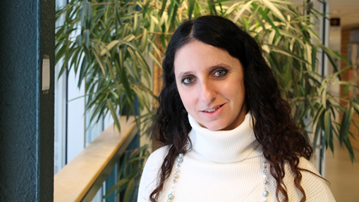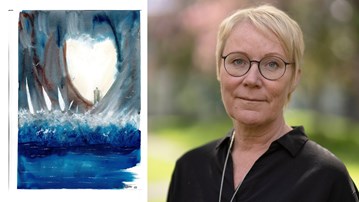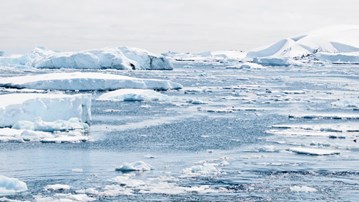Research group The research group comprises scholars who are joined by their engagement with speculative fiction and who explore central contemporary issues, connected to climate, society, technology, identity, and kinship.
Speculative fiction is a broad term applied to literature and other art forms that in some way depart from mimetic, realistic fiction via the inclusion of fantastic elements. This definition encompasses works that can be categorized into established genres such as science fiction and fantasy, but also works that do not adhere to any specific genres, or whose representations are only incrementally removed from the world as we know it.
Beginning with the question “what if?”, works in speculative fiction may thus create and explore worlds and concepts that are close to or very distant from our own. In these worlds, polar ice caps may melt slightly ahead of real-world predictions or rising sea levels may force people to live in floating cities; changed ecologies that require minute adaptations may be envisioned or plants may develop sentience and acquire full citizenship within human communities; real-world challenges to urban structures may be slightly exaggerated or cities may come alive as avatars. The setting in speculative fiction may be a version of the world as we know it, other temporalities, or other places and planets.
The participants in the network share the common overarching goals of demonstrating the significance of speculative fiction as a narrative form and how it contributes to greater understanding of contemporary social issues and debates. They explore, for example, how speculative fiction negotiates and represents environmental challenges, issues around technology and change, norms connected to identity, family, gender, and (dis)ability, and altered paradigms that decentre the human. Theories and methods that underpin and design analyses are found within fields such as material ecocriticism, posthumanism, critical disability studies, feminism and queer studies, and critical kinship studies.
The members of the research group are affiliated with the national Speculative Fiction Network.
Anna Bark Persson
I work with speculative fiction through the lens of and in dialogue with feminist and queer theory. In my dissertation, I examined the entanglements of power, masculinity, and embodiment in the use of the Viking motif in contemporary Anglophone fantasy literature. In my current postdoc project, I study queer and feminist speculative visions of Mars as an alternative to mainstream narratives of Mars and space exploration and colonization.
Irene Bordignon
My research focuses on studying how speculative fiction can play a crucial role in raising awareness about the climate crisis. My main interests are contemporary young adult literature and ecocriticism, especially in relation to the posthuman and cognitive dimensions. I’m currently exploring the ways in which ice-texts and Arctic-related narrations help (re-)shape young adult minds towards more sustainable approaches. In this, I also consider advantages and/or disadvantages of the peculiar liminality phase in which the coming-of-age process takes place in these narratives. Furthermore, my aim is to consider the potential of ice-texts for ecocritical readings: they indeed produce critical nature relations and allow us to re-evaluate human-nature-connections.
Peter Kostenniemi
My research on speculative fiction has primarily revolved around the Gothic in Scandinavian, contemporary literature for children and youth. This was the subject of my thesis, in which I investigated how the Gothic creates images of the child that reflect but also problematize notions of the child in a social context. In addition to this, I have written articles about dystopian literature and its relation to welfare society. My ongoing postdoc project in literary studies with a didactic orientation is entitled “Unpleasant children” (”Obehagliga barn”) and there I continue to investigate representations of the child in culture, now with an emphasis on ideas that are in conflict with contemporary and historical ideals. Speculative fiction is still included as part of my material, both the Gothic and dystopias.
Maria Lindgren Leavenworth
I have worked with speculative fiction for a long time, with a start in how vampire text worlds, and then particularly de-fanged, romantic vampires, were transformed in fan fiction and used to criticize popular culture norms. More recently, I have mapped and analyzed how the Arctic is imagined in speculative fictions from Mary Shelley’s Frankenstein until today. My interest lies in how speculative fictions draw from real-world discourses but add new ‘Arctics’ to the textual tradition. From this project, I take inspiration to further investigate how speculative fiction in inventive ways represent interconnectedness between climates, places, and life forms, and how it thereby partakes in imagining more sustainable futures.
Van Leavenworth
Speculative fiction has been the dominant focus in my research. In previous work, I examined how the poetics of literary Gothic conventions, tropes and elements are reinvented in interactive fiction, a contemporary digital text form. A major focus in this research was on conceptions of character subjectivity, which I have also explored in science fiction but with additional consideration for how relations between human/self and artificial/other are maintained and negotiated via gender expectations and environmental discourses. In more recent work, I investigate how specific works of speculative fiction imaginatively address current challenges with climate change in a productive way, and at times suggest possibilities for more sustainable futures.
Josefine Wälivaara
My research on speculative fiction deals with normativity in relation to sexuality, (dis)ability, and gender as well as questions regarding genre and narrative conventions across various media. Since I completed my thesis on sexuality, queerness, and (hetero)normativity in science fiction I have been interested in how norms and power relations are perpetuated and/or challenged in speculative fiction. In recent years, I have explored the relationship between discourses about the future and (dis)ability and mental illness through popular cultural depictions of the future. In my current research, I examine genetic manipulation, eugenic discourses, and (dis)ability in the utopian future of Star Trek and explore narratives about clones and artificial intelligence in terms of crip/queer time.
Berit Åström
My research into speculative fiction has predominantly been through the lens of critical kinship studies. In earlier projects, I have explored how texts conceptualise and re-imagine ideas of close relations in new contexts, in particular in representations of motherhood but also parenting and carework in general. In my current work, I am expanding the scope to consider instances of transspecies kinship as well as kinship networks comprising human and artificial intelligences, with a focus on how speculative fiction makes sense of current challenges to kinship formations and practices of care and in what terms possible alternatives can be envisaged.

Irene Bordignon, visiting PhD student, is interested in climate change with a particular focus on the Arctic.

"The Arctic has moved into our consciousness as a central part of the Earth's machinery."

Speculative fiction can inspire initiative and action on existing climate challenges.